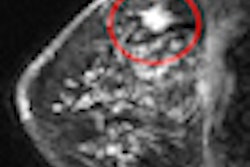Using MRI to measure hippocampal volume is not a good method for predicting subsequent cognitive decline in older adults from the general community, according to a study presented at the American Academy of Neurology (AAN) annual meeting in Toronto earlier this month.
A team led by Owen Carmichael, Ph.D., sought to determine whether previous findings regarding cognitive decline and MRI brain measurements in studies of homogeneous populations hold true in a heterogeneous sample that more closely resembles communities across the U.S.
Most of the earlier studies showed that hippocampal volume predicts subsequent cognitive decline -- that is, those with a smaller hippocampus are more likely to experience cognitive deficits as time passes.
"But in other studies, the vast majority of subjects are well-educated Caucasians," Carmichael told AuntMinnie.com. "We wanted a cohort that could be generalized to the population at large."
Carmichael and co-investigators from the University of California, Davis (UCD) Alzheimer's Disease Center and the Department of Veterans Affairs Northern California Health Care System are following 307 older adults in this ongoing study. Sixty-eight percent of participants were recruited via cold calling in the Davis area, and the others agreed to join the study after seeking a clinical evaluation at the center.
The study cohort includes 129 Caucasians, 99 African-Americans, and 79 Hispanics. The average age at recruitment was 75.9 years, and the participants had a mean 12.6 years of education.
The investigators used the Spanish and English Neuropsychological Assessment Scales for the cognitive assessment. Each subject was tested at least twice, over an average of 2.9 years. All study participants also had a set of baseline 1.5-tesla MR scans an average of 3.2 months after their baseline cognitive assessment. These comprised a T1-weighted fast spoiled gradient-recalled (FSPGR) image for determining the volume of the hippocampus and cranial vault as well as overall brain volume; and an axial-oblique 2D fluid-attenuated inversion recovery (FLAIR) fast spin-echo scan to determine volume of white-matter hyperintensities (WMH).
The baseline results showed that hippocampal, total brain, and WMH volume were all strongly associated with episodic memory -- that is, the larger the volume, the more robust the subject's memory at baseline. There was a similar association between total-brain and WMH volumes and executive function, and total-brain and hippocampal volumes and semantic memory.
However, the investigators also found that there were no associations with baseline hippocampal volume and subsequent changes in episodic memory, executive function, or semantic memory. In contrast, they did find that higher baseline total-brain volumes were associated with slower subsequent declines in episodic memory, and higher baseline WMH volumes were associated with more rapid deterioration in executive function and semantic memory.
These results all remained constant after the researchers controlled for the presence of infarcts on MRI and for community versus clinic recruitment. Clinical diagnosis -- that is, normal cognition, mild cognitive impairment, or dementia -- and age also did not alter these patterns, although they did attenuate them. Furthermore, the results also indicated that ethnicity, gender, and education were related to baseline cognition, and ethnicity was related to the subsequent rate of cognitive change.
"The crux of the issue is that based on earlier studies, radiologists can have a good handle on what to look for -- in terms of the relationship between brain MRI parameters and subsequent trajectories of cognitive decline -- in Caucasians who are highly educated and have a high socioeconomic status," concluded Carmichael. "But with respect to the patients that are present in most communities across this country, those relationships are not that clear or well understood."
By Rosemary Frei
AuntMinnie.com contributing writer
April 26, 2010
Related Reading
MR scans may detect signs of early dementia in elderly, April 14, 2010
Hypertension linked to white-matter disease progression: study, January 8, 2010
DTI beats standard MRI in predicting early memory loss, study shows, January 6, 2010
1.5T MRI with continuous ASL may detect early Alzheimer's, December 12, 2009
ASL-MRI identifies mild cases of Alzheimer's in elderly patients, November 10, 2009
Copyright © 2010 AuntMinnie.com



















